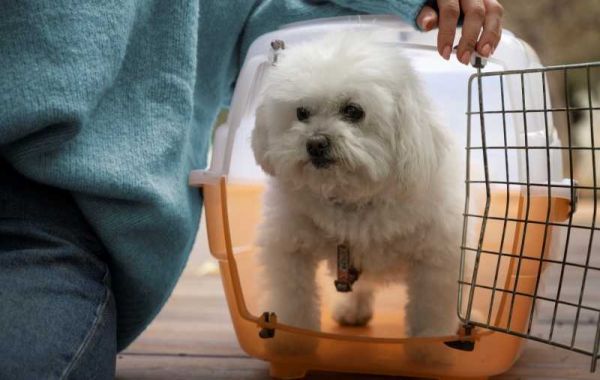Like any responsible pet owner, one of your top priorities is the protection of your fluffball. Are you a frequent traveler both domestically and internationally? Do you want your dog to accompany you on your journeys and be kept safe from external threats? Would you like to reduce his anxiety and provide him with a safe space in which he can retreat? If that's the case, you should invest in a dog crate. A high-quality crate will act as a secure environment in which your dog won't need your direct supervision.
Does your dog suffer from separation anxiety, and this results in destructive tendencies? Would you like your fluffball to get used to not sleeping on your furniture? Do you have a cat or another dog and want to avoid fights? If so, a dog crate can be an excellent purchase. Maybe, at first, your fluffball won't be keen on staying put inside an enclosed space. However, with the passing years, his crate could become a safe retreat in which he can feel comfortable. Canine crates are some of the most versatile accessories you can buy and can be essential for the healthy and predictable development of your pup.
What Are the Characteristics of a Quality Crate?
For one thing, the dog crate you purchase should be appropriately sized for your pup's dimensions. Furthermore, canine crates must be constructed from rigid and durable materials, such as stainless steel, which will keep their shape intact even in the case of external impacts. The locking mechanisms of the purchased crate must be robust to prevent accidental openings that could put your dog in danger. Simultaneously, the outer panels of the crate must provide ample ventilation.
Is your dog at the age where accidents are bound to happen? Then, it would be best if you also looked for a crate with a removable plastic floor. Not least, the crate you purchase will need to be compatible with your subjective use cases. Do you plan to travel internationally? Then, it would be best if you looked for an IATA-compliant crate that is appropriately sized for the dimensions of your pup.
Would you like to use your crate for house training? Is the price more important than the sturdiness of the build? If so, you could choose wire crates. Finally, if you plan to travel by car and you're not keen on investing a significant sum in metal crates, you could pick one with soft-sided panels. Quality kennels are easy to spot and can be crucial for the safe transportation and training of your puppy. Moreover, their abundance on the Australian market means you can find an appropriate option regardless of your budget.
How Can You Choose the Right Crate Size?
Perhaps the most important thing to look out for when selecting a dog kennel is its size. How can you choose the right fit for your pup? First, you will need to use a ruler. When looking for crates, you will need to keep three dimensions in mind—length, width and height.
To determine the necessary length of the crate, you will need to measure your dog from the tip of the tail to his snout. To determine the height, you must measure the distance between the top of his head and the ground, while the width is calculated by measuring his widest point. Is your puppy somewhat of a fluffball? Then, the widest point might be his belly. Have you kept his diet under control? In that case, you will have to measure the distance between his shoulders.
Typically, the crate you purchase should be 10-15 cm bigger than the size of your pup. For example, are you the owner of a tiny Pomeranian, which is 40 cm long and has a standing height of 30 cm? If that's the case, an appropriate-sized crate would be 55 cm x 40 cm x 45 cm. Do you own a French Bulldog? Then, a 92 cm x 61 cm x 66 cm-sized crate will be suitable. Do you wish to transport a Rottweiler? In that case, you will need something more spacious and sturdier. A 120 cm x 80 cm x 85 cm crate might be required. The advantage, however, is that canine crates can be found in an impressive variety of sizes, suitable for both toy dog breeds as well as large ones weighing over 45 kg.
What Types of Crates Can You Purchase?
What crate is appropriate for your situation will depend on your preferred use case and the budget at your disposal. Do you need a versatile and cheap crate that you can use primarily for house training? Then, you could choose one made of metal wire. These types of kennels are lightweight and perfect if you live in a hot area where ventilation is a top priority. Likewise, if costs are a concern, you might consider soft-sided crates, which are characterised by portability and lightweight construction.
Do you want to travel with your dog, and so you are looking for something that will be approved by most airlines? Then, it would be best if you went for metal-built, heavy-duty dog crates. These types of kennels are more expensive than their plastic counterparts, feature reinforced bars, and are heftier. However, they are the best option for powerful breeds that tend to move around. Finally, if you want the best of both worlds, you should choose travel cases made of durable plastic. These crates are more enclosed than those made of wire, but they are not as bulky as ones made of metal panels. So, they are the most popular choice on the market.
A Long-Term and Cost-Efficient Investment
Is your pup at the age where he gnaws whatever item gets in his gaze? Want to avoid unfortunate events while you're at work? Then, a crate could be an excellent purchase. When they are sturdy and easily transportable, canine crates are a tool by which you can potty train your fluffball and correct behavioural issues before they can develop into something undesirable. Does your puppy have frequent accidents? Want to teach him to stop soiling the carpets of your apartment? If so, crates could help. Dogs avoid doing their business in sleeping areas, so with time, your puppy will learn how to control his bladder and bowel movements.
Will this eliminate accidents in their entirety? No. However, crates could significantly speed up the house training process. Plus, a dog crate can act as a comfortable den-like space in which your companion will feel cozy and aid in case you have house guests and want your anxious pup to rest in his safe space. Crates are a necessity if you plan to go on road trips with your pup; they can be a tool by which you manage your household order and are the only realistic way by which your dog can be transported to your local veterinarian for annual checkups.








